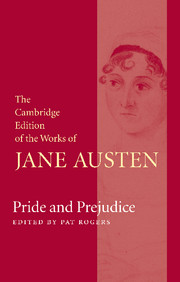Book contents
- Frontmatter
- Contents
- General Editor’s Preface
- Acknowledgements
- Chronology
- Introduction
- Note on the Text
- Pride and Prejudice
- Pride and Prejudice: Volume I
- Pride and Prejudice: Volume II
- Pride and Prejudice: Volume III
- Corrections and Emendations to 1813 text
- Appendix 1 Thomas Egerton and the Publication History
- Appendix 2 Legal and Military Background
- Appendix 3 Pemberley and its Models
- Appendix 4 Note on the second and third editions of Pride and Prejudice
- Abbreviations
- Explanatory Notes
Appendix 1 - Thomas Egerton and the Publication History
Published online by Cambridge University Press: 19 December 2020
- Frontmatter
- Contents
- General Editor’s Preface
- Acknowledgements
- Chronology
- Introduction
- Note on the Text
- Pride and Prejudice
- Pride and Prejudice: Volume I
- Pride and Prejudice: Volume II
- Pride and Prejudice: Volume III
- Corrections and Emendations to 1813 text
- Appendix 1 Thomas Egerton and the Publication History
- Appendix 2 Legal and Military Background
- Appendix 3 Pemberley and its Models
- Appendix 4 Note on the second and third editions of Pride and Prejudice
- Abbreviations
- Explanatory Notes
Summary
The title-page of the first edition lists ‘T. Egerton, Military Library, Whitehall’ as publisher. He has sometimes been called ‘the obscure Mr Egerton’, but this applies only to his standing in the area of belles lettres. Thomas Egerton had issued Sense and Sensibility two years earlier, although his name does not appear until the second edition of 1813. He had entered the trade in the early 1780s, acting for the first decade in partnership with his brother John (d.1794/5), and then succeeding to the shop, business and predominantly military list of the bookseller John Millan, who had published the Army lists. Reference books record his start as occurring in 1784, when Millan died, but his name appears in the imprint of Letters Military and Political, from the Italian of Count Algarotti (1782) and of Narrative of a Shipwreck on the Island of Cape Breton (1783). Thomas, who may have begun as a printer as well as a bookseller, remained active up to the time of his death in 1830. Together the brothers held a number of auctions for large book collections. The speciality of the firm always lay in the military field, with characteristic titles such as Instructions to Young Dragoon Officers (1794) and A Treatise on Military Finance (1796). After the turn of the century Thomas continued in the same vein with titles such as The Military Catechism (1804), printed by C. Roworth, who would be responsible for the first volume of Pride and Prejudice. Egerton also branched out into naval history. His shop was located in Scotland Yard, on the east side of Whitehall just across from the Admiralty Office (near the site later occupied by the War Office), and he shrewdly gained an appointment as official bookseller to the naval board. What he practically never produced were novels: only five instances, outside Austen's works, have been recorded, and all of them postdate Pride and Prejudice. In other words, the two first works of fiction which Egerton produced were Sense and Sensibility and Pride and Prejudice.
- Type
- Chapter
- Information
- Pride and Prejudice , pp. 437 - 440Publisher: Cambridge University PressPrint publication year: 2006



